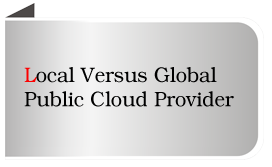

Yasser Zeineldin, CEO, eHosting DataFort, a managed hosting and cloud infrastructure services provider debates the pros and cons of choosing a local vs global public cloud provider.
In an age of the internet of things (IoT) whereby everyday devices - from heart monitors to kitchen appliances - can talk to each other over the internet and make life simpler, cloud computing is pushing economic competitiveness around the globe.
According to a report by Gartner,at least 20 percent of all global cloud services will be disbursed via internal or external cloud service brokerages by 2015. In a similar report,industry analysts have projected that worldwide spending on public IT cloud services will exceed US$107 billion by 2017. What's more, public cloud is growing by leaps and bounds with predictions of revenues reaching US$20 billion by 2016.
International players such as Google, Amazon and Dropbox dominate the global public cloud market. However, in the Middle East, where concerns still linger over the inherent security risks associated with adopting public cloud,cloud computing is just starting to gain momentum. Even recent incidences such as the 'Snowden Effect' have affected a historical market like the US, which has been a leader in providing international cloud computing services.
This poses some important questions: Are regional organizations ready for the public cloud? And are service providers prepared to tackle the new age security threats?
At least in the UAE, this certainly seems to be the direction in which the market is headed. Earlier this year, for instance,the UAE announced a doubling of its homeland security spend with a major portion allocated to cyber security.
Enterprises, governments and financial companies now prefer to keep their data local as easy accessibility becomes a growing priority. Another advantage is complete control, which helps enterprises stay on top of security concerns and conduct audits as and when required.
In addition using a local Cloud provider results in lower latency and faster access to applications as the infrastructure is hosted within the GCC region compared to using a global public cloud provider whose infrastructure is hosted outside the ME region
For many organizations,choosing between a public and private cloud is a challenge.It gets even more daunting to decide whether to work with a global public cloud services provider or a local public cloud services provider.
However, there is no one size fits all solution - the same cloud service is not appropriate for every application, user group or organization.
One of the key reasons enterprises use public cloud services is the cost saving benefits and the fact that one does not incur any capital expenses. Exercising due diligence is a must, especially when looking for reliability, availability and, more importantly, security.
Most public cloud providers claim to provide all of these. However, when one looks closely, it is evident that some providers can only offer security up to the point of abstraction and no higher. The provider will be responsible for security at the server level but the customer is ultimately responsible for security of their own applications.
With public cloud service providers in the same country, one has instant access to customer service without a lag in time-difference or having to speak to an agent in another country who may not understand the actual on-ground difficulties.
In-country public cloud service providers are typically compliant with regulations and follow both local and international security compliance policies. For example, at eHosting DataFort, our data centers are based in the UAE and we are certified for international certifications.
Given these benefits, we are witnessing several enterprises transitioning to a local cloud services provider. Custom made solutions allow customers to integrate disaster planning into their business operations to ensure efficiency.
What organizations are also becoming aware of is that critical data hosted anywhere including in-house data centers need to be managed and controlled via standards, processes and technology. The benefits of outsourcing these to a local cloud services provider take away the stress of staffing and help in maintaining fixed operating expenses. All of this can be achieved whilst maintaining confidentiality and high security levels.
The case for cloud itself is not an easy one but choosing between a global public cloud service provider and one that is based locally plays an equally important role in the CIOs decision-making process. One big pointer that determines which option fits best is the size of the organization. Large enterprises and smaller organizations with local user groups are perhaps better served with a local cloud services provider.
Several regional companies are presently opting for hybrid cloud services - this approach looks like it's here to stay for the foreseeable future. The trick is to cut through the hype and fine print,be aware of organizational needs and better understand the options available in the market-- before making that leap to the cloud.
